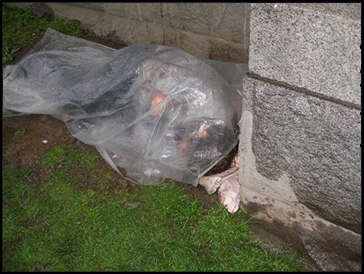
Canada has always had its own way of doing things. Check out this radical plan for not only getting people experiencing homelessness off the streets, but turning their lives around:
At Home runs with a housing first philosophy, so residents aren’t required to abstain from using drugs or to comply with their medications to keep their housing… The building, which is staffed by nurses, mental health and social workers, will be served by a psychiatrist, and offers three meals a day, art classes… yoga and acupuncture.
Acupuncture? Drugs? Yes, and journalist Cheryl Rossi quotes the site coordinator, Catharine Hume, who says,
It’s meeting people where they’re at, providing them with a space where they can actually breathe a little bit and actually consider options that maybe they haven’t considered for years.
One resident interviewed by Rossi, for instance, reported that his cocaine habit has decreased drastically since he has moved into the Bosman Hotel Community in Vancouver. Located in the province of British Columbia, this facility was created through the joint efforts of the Mental Health Commission of Canada (MHCC) and the PHS Community Services Society that have renovated the old hotel. It opened in the summer of 2010.
The Bosman Hotel Community includes residents whose ages range from 25 to 74, and about a quarter of them are women. The residents, some of whom have been on the street for as long as 20 years, have not only private rooms, but their own bathrooms. Most importantly, they receive help under a philosophy called “housing first.” In other words, the goal is to get them under a roof first, and then address their other problems, whatever those problems may be. All the residents suffer from some kind of mental illness.
Could people in the United States benefit from a similar program? Absolutely. In Looking Up at the Bottom Line, Richard R. Troxell says of the miserable failure of de-institutionalization in the States:
In 2010 it has been conservatively estimated that a third of our nation’s homeless are suffering serious mental health problems. They now live under bridges.
In Vancouver, the Bosman Hotel is one of several single-room occupancy (SRO) facilities either already open or in the process of renovation. The program under which these are administered is called “At Home/Chez Soi.” (In bilingual Canada, the dual name is standard.) Old hotels are bought by the provincial government, get fixed up, and are run by nonprofit agencies. “At Home/Chez Soi” is a research and demonstration project that involves five cities and is funded through March 2013.
The “At Home/Chez Soi” philosophy is spelled out in an Open Letter written by Janet Yale,
chairperson of the Leadership Table on Homelessness (PDF) in Ottawa, a participating city in another Canadian province, Ontario. She outlines the goals and beliefs of Destination Home, a massive 10-year plan that involves numerous government agencies and community organizations. Yale points out the pragmatic side of the solution: Studies have shown that the taxpayers can house the homeless for about one-fifth the cost of maintaining the status quo.
Ottawa’s homeless shelters generally help people through difficult transitional periods, but it was noticed that a small percentage of the most vulnerable population are unable to escape the condition of chronic homelessness. Yale explains how somebody did the math:
[… I]t costs us about $100,000 per person per year to keep them exactly as they are versus the $18,000 per person per year it would cost to find them real homes and provide them with the supports they need to help them stay housed. Beyond costly shelter per diems, allowing this revolving door to remain open means we are also paying for unchecked visits to hospital emergency rooms, mental health stays, incarcerations and police and emergency responses.
When mentally ill, chronically homeless people are transformed into housed people with a support system, everyone benefits. The city is safer, the business owners are not inconvenienced by raggedy folks sleeping in their doorways, the tourists are not turned off by the sight of them, and the entire community feels better about itself for knowing that it is doing the right thing.
Source: “New social housing project to study mental illness and homelessness,” The Vancouver Courier, 08/23/10
Source: “Destination Home/Chez Soi” (PDF), DestinationHome.ca, 10/07/10
Source: “Looking Up at the Bottom Line,” Amazon.com
Image by quinet (Thomas Quine), used under its Creative Commons license.


